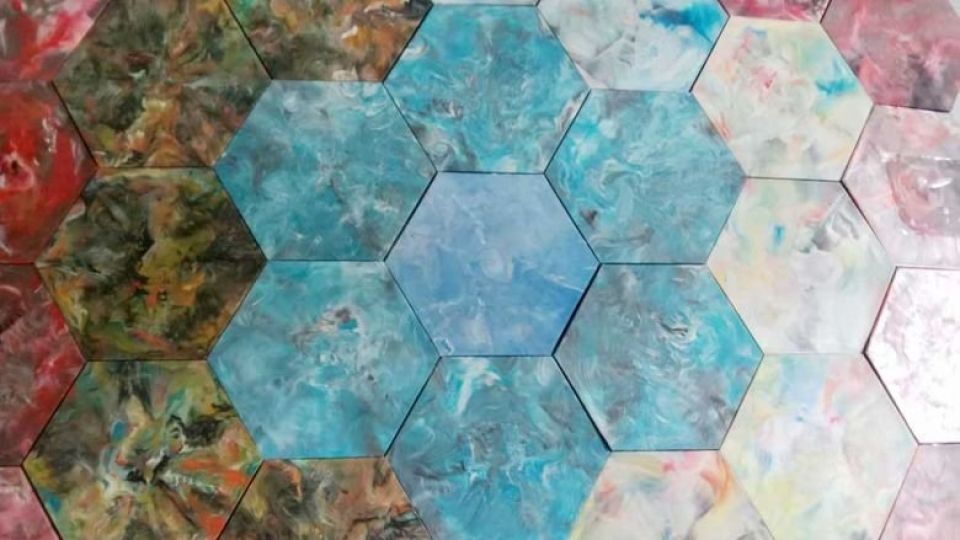PHNOM PENH (ANN/THE PHNOM PENH POST) – A group of individuals collaborating with the Disability Development Services Programme (DDSP), a Cambodian non-government organisation (NGO) situated in Pursat province, breathe new life into plastic bottle caps, shampoo and lotion containers, transforming them into student rulers, plastic tiles for home decor, and various other useful items.
Cheam Phanith, 28 years old and a resident of Tuol Char village in Anglong Vil commune, Pursat province’s Kandieng district, skilfully handles slippery plastic bottles on his knee.
Using only his thumb, he adeptly wields scissors to cut the bottles into pieces at the DDSP facility in Banteay Dei Leu village.
With a paralysed left hand and just one thumb remaining, Phanith shared the story of how he became disabled in 2017 while working as a carpenter in his village.
An accident occurred while he was feeding wood into a bandsaw, causing him to slip into the machine.
The immediate response from his team was to rush him to Pursat Provincial Referral Hospital, where four of his fingers had to be amputated, leaving him with only one thumb.
Phanith explained that after his injury, and without a wife, he encountered difficulties in securing employment.
However, in 2022, he seized an opportunity at the DDSP.
There, he and five other individuals are tasked with recycling plastic waste and turning it into useful and decorative items.
Phanith mentioned that due to his village’s proximity to the organisation, he can easily commute to work independently on his motorbike.
He felt immense joy when the organisation gave him the opportunity to work.
In the past, he endured feelings of being underestimated and unappreciated.
The organisation not only welcomed him, but also appreciates his contributions.
“I am thankful that the programme provides employment opportunities for individuals with disabilities like me,” he said.
“In some other places, I frequently encountered discrimination, and they didn’t provide me with job opportunities. Now, thanks to the programme, I can earn a living to support myself,” he added.
Kak Sreymom, a special education teacher responsible for supervising the plastic recycling project, shared some insights into the project.
She explained that the team is composed of six individuals with disabilities, including some who are deaf, mentally unwell, paralysed in both legs, visually impaired in one eye, and paralysed in either one hand or one leg.
Together, these individuals form the plastic recycling team.
Each day, the team takes turns gathering bottles from shops and public areas within Pursat town.
Their collection includes a variety of plastic, like water bottles, lotion containers, shampoo bottles, and more.
She explained that all kinds of plastics, even plastic bags, can be recycled.
At present, the organisation has two machines for dissolving plastic and one for crushing it.
The moulds are tailored to deal with water and lotion bottles. Other varieties of plastic waste must be collected, ground, and stored until a suitable mould becomes available for their specific type. Only then can they proceed with further recycling.
“At our organisation, all young people with disabilities are offered employment opportunities to help them earn a modest income for self-support. This place is filled with individuals with diverse abilities,” said Sreymom.
She explained that the collected bottles go through a specific process. Initially, they are cleaned with water to remove any dirt. Next, they are cut into small pieces using scissors. Finally, they are fed into a grinder, where they are shredded into even smaller pieces.
Next, they’re put in an oven to melt and fuse together. Once melted, the plastic is poured into moulds of various shapes each tailored to a specific function, like wall decor or garden fencing.
She explained that the programme collaborates with other organisations. These partners help in buying rulers, which are then distributed to over 1,000 primary school students in multiple districts across the province.
Pen Sina, director of the DDSP’s Inclusion Training Centre, told the source that the organisation was established in 2003 with the primary mission of aiding individuals with disabilities and receiving support from partner organisations. However, after the Covid-19 crisis, many of these organisations withdrew their support.
Despite the withdrawals, the programme perseveres with its efforts to sustain itself. They continue to receive assistance from select partner organisations.
Additionally, the government has extended a helping hand through the Ministry of Education, Youth and Sport, and the Ministry of Social Affairs, Veterans and Youth Rehabilitation. This aid includes wheelchairs and financial support.
He added that at present there 20 individuals engaged in the plastic recycling project in Pursat, which commenced in September 2019.
As for collecting plastic bottles, many shop owners set them aside for recycling purposes.
“Recycling plastic waste offers significant benefits. It prevents plastic from becoming littering, reduces overall plastic use, benefits the environment, and provides income opportunities for people with disabilities,” Sina explained.
Kong Puthyra, the director of the Pursat provincial Environment Department, commended the recycling initiative.
“I support and encourage the continuation of this work because plastic waste has a significant impact on the environment. Neglecting it can harm the soil and burning it releases harmful fumes that jeopardises health, pollutes the air, and depletes oxygen,” he said.



